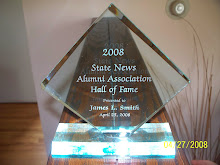 Found this item over on Gannett blog about a paper in Monroe that reportedly (I say that because it was a leak from an anonymous poster) does not allow newspaper employees to leave the building with a free newspaper.
Found this item over on Gannett blog about a paper in Monroe that reportedly (I say that because it was a leak from an anonymous poster) does not allow newspaper employees to leave the building with a free newspaper.Like the Flint Journal, employees can subscribe for half price and the manager reminded his employees that there was no such thing as a free paper.
It did remind me of the Oakland Press newsroom (which, like the Journal, let us take as many free papers as we needed) back in the 1980s. As a convenience to reporters and to keep the newsroom a little neater, the first run papers were dropped off in a newspaper box that had been rigged to stay open.
It looked like a regular street sale box, but all you had to do was pull on the door and it would open.
A new business reporter was hired in 1985 and in the middle morning, after deadline, the newsroom could be a pretty quiet place. Many of us were rapidly reading the pages of the first edition trying to catch any glaring errors that could be fixed on the fly for the later editions.
Others had escaped to begin working on stories for the next day, or perhaps just gone to pick up their dry cleaning or do their shopping, could have been just about anything that cleared out a newsroom.
So I was sitting at my desk, which was only a short distance from the paper box, when I was startled to hear two coins (I think the paper was 35 cents at the time, could have been 50 cents, I just don't remember) drop into the empty metal coin box on the paper machine.
I looked up to see the new business reporter pulling open the door and taking out a paper.
With a twinge of a sarcastic tone, I said the the new reporter: "Unless you really screw up, they don't make you pay for those."
Maybe you had to be there.


7 comments:
I remember hearing about Roger going around the building and brow beating anyone that wasn't subscribed to the paper. He was right... If you all would have have subscribed back then we would still be a seven day paper.
GRIN
I WAS there. A classic moment right up there with the 1986 earthquake and God only knows what else I've forgotten as part of my brain's defense mechanism.
Hey, Bob, good to see you on here. It always surprises me who is lurking around the blog.
My e-mail is below, let me know what you are up to. I think I remember the name of the business reporter, but am not 100 percent sure. He was a tall, lanky guy, but for the life of me I can't remember his name.
The earthquake is another great memory, that I had forgotten about until you mentioned it.
It was a nice day and I was in Holly on an assignment when it happened.
what about all that end up in the trash at the ened of the day ? that's just ridiculous. PENNY WISE AND DOLLAR FOOLISH !!
I've never understood why newspapers don't require employees to pay for a half-price subscription. First of all, it could mean an immediate jump in subscriptions by at least half of the building's workforce.
The way I look at it, my neighbors know I work for the local newspaper.
If they don't see the paper on my front porch every morning, I think it says to them that if the guy who works at the paper doesn't care enough to subscribe to his own product, why should I?
Plus, you got to have a sense of loyalty to the product you're putting out. So you pony up $7.50 a month for a half-priced subscription. That $7.50 goes a long way to maintaining a solid subscriber base to charge advertisers that pay your salary. And what else can you buy for $7.50? Two glasses of beer at the Blackstone?
Not subscribing to your own newspaper is tantamount to driving a Toyota while working at a GM dealership, in my book.
But there are people who work (or formerly worked) in newsrooms who feel entitled to a free newspaper every day. As if it's some kind of fringe benefit.
My question is: What about the weekends when you're not working?
Do you wait until Monday to read Saturday's news?
When I worked in Jackson, I served on a circulation committee to combat the falling number of subscribers. One of our recommendations to the publisher was to require all employees to subscribe. We figured it could boost circulation by 80-100 papers per day.
I left the paper in March 2008 -- six months after none of the committee's recommendations (including selling newspaper subscriptions a la carte for people who wanted just the Thursday and Sunday papers) had been implemented.
You make a good point, Chad, but a circulation growth strategy that relies on getting employees to pony up for a subscription is kind of like buying up all of your kid's Girl Scout cookies so she doesn't have to do the hard thing ... actually sell them. Newspapers historically have done a pretty bad job of selling themselves and giving away content for free and now, unfortunately, people don't think they need them.
Post a Comment